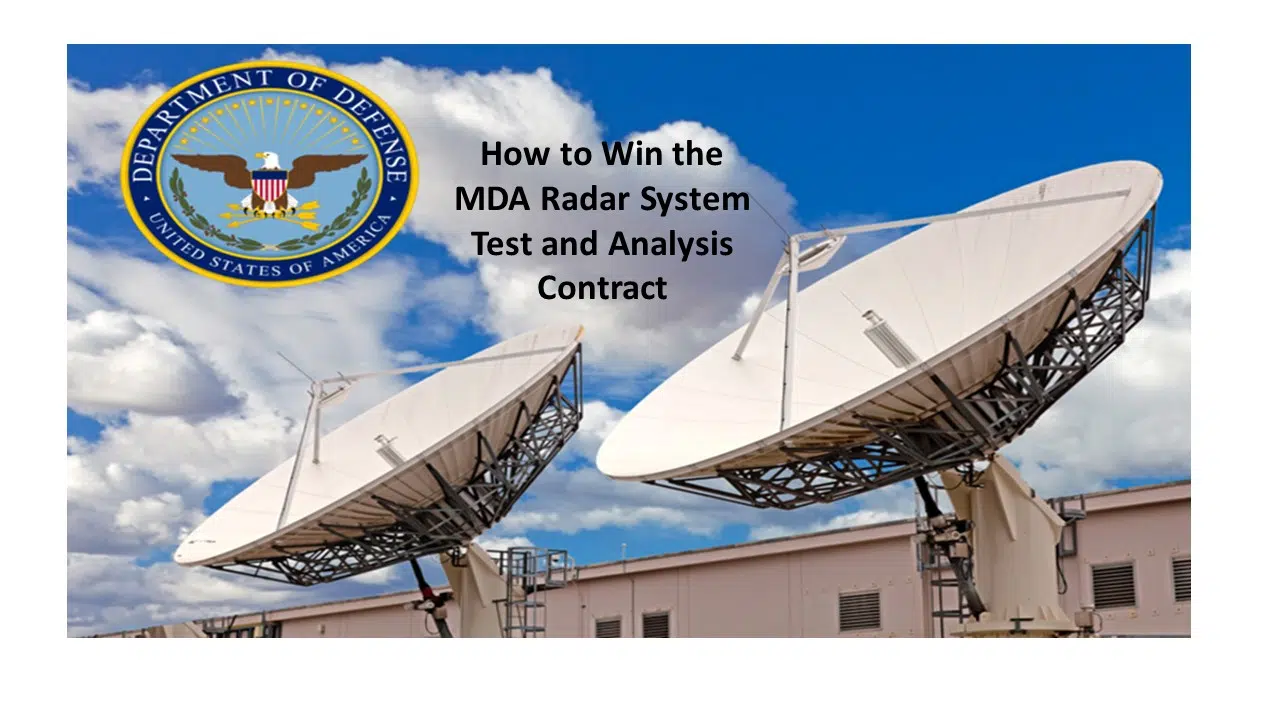How to Win the MDA Radar System Test and Analysis Contract
Introduction
The United States Department of Defense (DoD) is seeking qualified contractors to provide support services for the Missile Defense Agency (MDA) Radar System Test and Analysis (RSTAC) program. The solicitation number for this contract opportunity is MDA23SNSPN05. The contract is expected to have a base period of five years, with a total estimated value of $700 million. The contract will support the MDA’s mission of developing and deploying a layered ballistic missile defense system (BMDS) to defend the United States and its allies from missile attacks.
Historical Background
The RSTAC program is responsible for managing the test and analysis activities of various radar systems and components that are part of the BMDS, such as:
- The AN/TPY-2, which is a mobile X-band radar that provides surveillance, tracking, and discrimination of ballistic missiles in the terminal phase.
- The Sea-Based X-band (SBX) radar, which is a floating platform that hosts a powerful X-band radar that provides surveillance, tracking, and discrimination of ballistic missiles in the midcourse phase.
- The Cobra Dane radar, which is a fixed L-band radar that provides surveillance, tracking, and discrimination of ballistic missiles in the midcourse phase
- The Upgraded Early Warning Radars (UEWRs), which are fixed UHF-band radars that provide surveillance, tracking, and discrimination of ballistic missiles in the midcourse phase.
- The Long Range Discrimination Radar (LRDR), which is a new S-band radar that will provide surveillance, tracking, and discrimination of ballistic missiles in the midcourse phase.
The RSTAC program is a successor to the previous program called the Radar Support Services (RSS), which was responsible for similar activities until 2021. The RSS issued several contracts under the solicitation number HQ0147-15-R-0002 in 2015, which were awarded to contractors such as Booz Allen Hamilton, General Dynamics, Leidos, Lockheed Martin, and Raytheon.
RFP Description
The RSTAC contract opportunity is a multiple-award indefinite delivery/indefinite quantity (IDIQ) contract that will provide a range of services, including:
- Radar system engineering and integration
- Radar test planning, execution, and analysis
- Radar data collection, processing, and dissemination
- Radar performance assessment and evaluation
- Radar modeling and simulation
- Radar training and education
- Radar program management
The contract will cover all the radar systems and components under the RSTAC portfolio, such as AN/TPY-2, SBX, Cobra Dane, UEWRs, LRDR, and others. The contract will require the contractor to adhere to the MDA’s policies, standards, and best practices, as well as the federal acquisition regulations (FAR) and defense acquisition regulations system (DFARS).
The proposal due date is 09/2023. The anticipated award date is 01/2024.
Who Should Participate
The RSTAC contract opportunity is a great chance for qualified contractors that have experience and expertise in providing support services for complex radar systems and components in the missile defense domain. The potential contractors should have:
- A proven track record of delivering high-quality services on time and within budget
- A deep understanding of the RSTAC’s mission, vision, goals, objectives, requirements, challenges, risks, opportunities, and stakeholders
- A strong team of qualified personnel with relevant skills, certifications, clearances, and experience
- A robust infrastructure of facilities, equipment, tools, and software
- A flexible and agile approach to adapt to changing needs and priorities
- A competitive and innovative edge to offer value-added solutions
Challenges
The RSTAC contract opportunity poses some challenges for both the MDA and the potential contractors. Some of these challenges are:
- Managing the complexity and diversity of radar systems and components across multiple domains, phases, and platforms
- Ensuring the reliability, availability, and performance of radar systems and components
- Leveraging the emerging technologies and innovations in the radar domain
- Balancing the competing demands and expectations from various users and stakeholders of radar systems and components
- Securing the resources, capabilities, and capacities to deliver the required services within the budget and schedule constraints
Conclusion
The RSTAC contract opportunity is a significant opportunity for qualified contractors to provide valuable services to the MDA in support of its mission of developing and deploying a layered ballistic missile defense system to defend the United States and its allies from missile attacks. The contract will require the contractor to demonstrate expertise, experience, and excellence in radar system engineering and integration, radar test planning, execution, and analysis, radar data collection, processing, and dissemination, radar performance assessment and evaluation, radar modeling and simulation, radar training and education, and radar program management. The contractor will also need to comply with the relevant policies, standards, guidelines, regulations, and best practices in the radar domain. The contract will present some challenges for both the MDA and the contractor in terms of managing the complexity, diversity, reliability, availability, performance, innovation, demand, expectation, resource, capability, capacity, budget, and schedule aspects of service delivery.
If you are interested in pursuing this contract opportunity, you may need some professional assistance to prepare a winning proposal. GDI Consulting is a leading provider of proposal writing, capture management, price to win analysis, and grant writing services for government contractors. GDI Consulting has helped hundreds of clients win billions of dollars in government contracts. GDI Consulting can help you:
- Conduct a thorough analysis of the solicitation and identify the key requirements, evaluation criteria, and win themes
- Develop a compelling proposal strategy that highlights your strengths, differentiators, and value proposition
- Write a clear, concise, and compliant proposal that addresses all the solicitation requirements and meets the MDA’s expectations
- Review and edit your proposal to ensure quality, accuracy, consistency, and readability
- Submit your proposal on time and in the required format
GDI Consulting has a team of experienced and qualified proposal writers, capture managers, price to win analysts, and grant writers who can help you win the RSTAC contract opportunity. If you want to learn more about how GDI Consulting can help you win, please visit us at [email protected] . We look forward to hearing from you soon.

